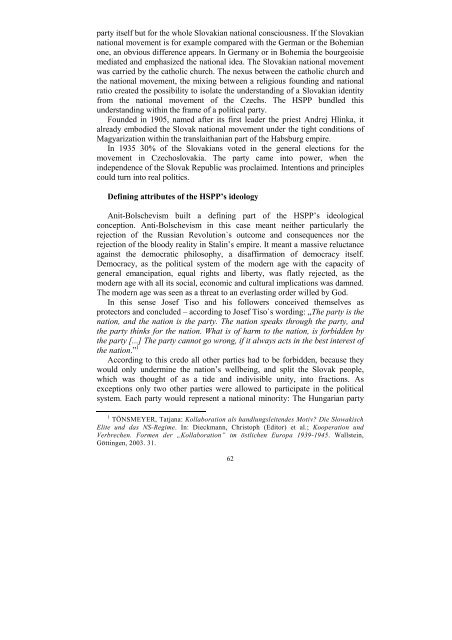The Molotov-Ribbentrop Pact - ELTE BTK Történelem Szakos Portál
The Molotov-Ribbentrop Pact - ELTE BTK Történelem Szakos Portál
The Molotov-Ribbentrop Pact - ELTE BTK Történelem Szakos Portál
Create successful ePaper yourself
Turn your PDF publications into a flip-book with our unique Google optimized e-Paper software.
party itself but for the whole Slovakian national consciousness. If the Slovakian<br />
national movement is for example compared with the German or the Bohemian<br />
one, an obvious difference appears. In Germany or in Bohemia the bourgeoisie<br />
mediated and emphasized the national idea. <strong>The</strong> Slovakian national movement<br />
was carried by the catholic church. <strong>The</strong> nexus between the catholic church and<br />
the national movement, the mixing between a religious founding and national<br />
ratio created the possibility to isolate the understanding of a Slovakian identity<br />
from the national movement of the Czechs. <strong>The</strong> HSPP bundled this<br />
understanding within the frame of a political party.<br />
Founded in 1905, named after its first leader the priest Andrej Hlinka, it<br />
already embodied the Slovak national movement under the tight conditions of<br />
Magyarization within the translaithanian part of the Habsburg empire.<br />
In 1935 30% of the Slovakians voted in the general elections for the<br />
movement in Czechoslovakia. <strong>The</strong> party came into power, when the<br />
independence of the Slovak Republic was proclaimed. Intentions and principles<br />
could turn into real politics.<br />
Defining attributes of the HSPP’s ideology<br />
Anit-Bolschevism built a defining part of the HSPP’s ideological<br />
conception. Anti-Bolschevism in this case meant neither particularly the<br />
rejection of the Russian Revolution`s outcome and consequences nor the<br />
rejection of the bloody reality in Stalin’s empire. It meant a massive reluctance<br />
against the democratic philosophy, a disaffirmation of democracy itself.<br />
Democracy, as the political system of the modern age with the capacity of<br />
general emancipation, equal rights and liberty, was flatly rejected, as the<br />
modern age with all its social, economic and cultural implications was damned.<br />
<strong>The</strong> modern age was seen as a threat to an everlasting order willed by God.<br />
In this sense Josef Tiso and his followers conceived themselves as<br />
protectors and concluded – according to Josef Tiso`s wording: „<strong>The</strong> party is the<br />
nation, and the nation is the party. <strong>The</strong> nation speaks through the party, and<br />
the party thinks for the nation. What is of harm to the nation, is forbidden by<br />
the party [...] <strong>The</strong> party cannot go wrong, if it always acts in the best interest of<br />
the nation.” 1<br />
According to this credo all other parties had to be forbidden, because they<br />
would only undermine the nation’s wellbeing, and split the Slovak people,<br />
which was thought of as a tide and indivisible unity, into fractions. As<br />
exceptions only two other parties were allowed to participate in the political<br />
system. Each party would represent a national minority: <strong>The</strong> Hungarian party<br />
1 TÖNSMEYER, Tatjana: Kollaboration als handlungsleitendes Motiv? Die Slowakisch<br />
Elite und das NS-Regime. In: Dieckmann, Christoph (Editor) et al.; Kooperation und<br />
Verbrechen. Formen der „Kollaboration” im östlichen Europa 1939-1945. Wallstein,<br />
Göttingen, 2003. 31.<br />
62













